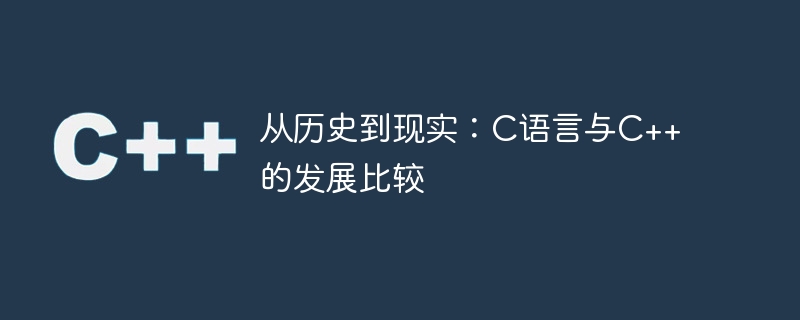

With the continuous development of computer technology, C language and C, as two important programming languages, play an important role in the field of software development. This article will compare C language and C from the perspective of historical development, and explore their advantages and characteristics in different aspects based on specific code examples.
First of all, to understand the development comparison between C language and C, we need to understand their respective origins and development processes. C language, as a structured programming language, was developed by Dennis Ritchie of Bell Labs in the 1970s. It is widely used in system programming, embedded development and other fields, and is widely praised for its simplicity and efficiency. C is developed on the basis of the C language and was developed by Bjarne Stroustrup in the early 1980s. C adds object-oriented programming features to the C language, making it more flexible, scalable, and a more powerful programming language.
In terms of grammatical structure, there are some significant differences between C language and C. C language is a procedural language with relatively simple syntax and more intuitive use. For example, here is a simple C code example:
#include <stdio.h>
int main() {
printf("Hello, world!
");
return 0;
}C introduces the concept of object-oriented and supports classes, inheritance, polymorphism and other features, making its code more organized and readable. Here is a simple C code example:
#include <iostream>
using namespace std;
class MyClass {
public:
void printMessage() {
cout << "Hello, world!" << endl;
}
};
int main() {
MyClass obj;
obj.printMessage();
return 0;
}In terms of application fields, C language is mainly used in system programming, embedded development, etc., because its code is relatively low-level and has high execution efficiency. C is more used in object-oriented software development, such as game development, graphical interface design and other fields, because it is more flexible and scalable.
In addition, there are some differences between C language and C in terms of memory management. In C language, programmers need to manually manage memory allocation and release, which may lead to problems such as memory leaks. C introduces the concept of RAII (resource acquisition i.e. initialization), which automatically manages resources through the construction and destructor of objects, avoiding the problem of memory leaks.
In general, C language and C each have their own advantages and characteristics. Which one to choose depends on the specific application scenarios and needs. In today's software development field, C, as a more powerful and flexible programming language, is favored by more and more developers. However, C language, as a low-level programming language, still has its unique advantages in fields such as system programming and embedded development. Therefore, it is crucial for programmers to understand and become proficient in both languages.
The above is the detailed content of From history to reality: Comparison of the development of C language and C. For more information, please follow other related articles on the PHP Chinese website!




